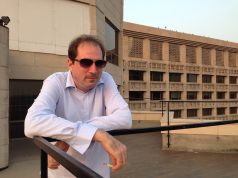The co-founder of Ukraine’s world renowned fact-checking website StopFake.org meditates on our brave new world of post-facticity and hybrid informational warfare, as well as on the line between propaganda and fake news, and what can be done to combat these pernicious tendencies.
We live in peculiar times.
It is a time when the truth and the idealization of truth, the idealization of facts no longer matter.
Or let me begin again. We are living in a time when many of those who try to make it seems like those things do not matter are in ascendence. With the help of modern algorithms catering to our personal tastes and preferences, as everyone now knows, we all live in carefully secluded and curated information bubbles that confirm our biases and keep us from understanding the thinking of our ideological neighbors. Technology has been matched by political ideology however, and information flows have been weaponized for the good of advancing geopolitical narratives in a way that has advanced the work of propagandists by lightyears.
That process began with Russian aggression in Ukraine, and the annexation of the Crimean peninsula three years ago, and with the Russian state backing up and basically creating a separatist movement in Eastern Ukraine, where none had existed before. For three years fake news had been the usual landscape Ukraine. This was long before the fake news came to America and infected the debates around the American presidential elections and became the topic that everyone was concerned with. So in a way, Ukraine became specialized in understanding- and confronting – the scourge of fake news before it became fashionable to do so. It was a knowledge was developed at great cost in blood and treasure to Ukrainian society. That hard gained expertise is something that Ukrainians will have to share with other liberal democracies under threat. In a way it will become an exportable national product, not unlike Ukrainian craft beer, great Lviv coffee, Ukraine’s genius for IT and wondrous agricultural yields.
After the Ukraine treaty referendum in the Netherlands became politicized by outsider actors, and after the elections in the US and in France (and along with the upcoming ones in Germany) – it became clear, that this is no longer an internal Ukrainian issue. It is similarly no longer an issue merely of theoretical politics as it directly influences everyday life of each and everyone of us living in liberal democracies even while we eat our burgers and falafels, drink our coffee latte or smoothie.
“Fake news” is the biggest issue facing us all now, echoing through discussion rooms and conference halls all over the world. Everyone thinks and talks about fake news, or is skeptical of fake news, or is accusing someone they disagree with or peddling fake news. It is everywhere bandied about by the media of every ideological stripe and by political figures ranging from Vladimir Putin and Emmanule Macron to Donald Trump.
But what is fake news? The question seems easy to answer one may think. It is merely what it proclaims itself to be. Yet, it is not as simple as it seems. Fake news might sometimes be based in some core truth or unimpeachable fact, or it might even be totally real in basis, but incorrect in interpretation. Yet the context, the witnesses, experts, evidence for part or all of a story might be manipulated or simply rigged.
The University of Oxford, Cyber Security expert Monica Kaminska, refers to it as junk news.
Alright, you might say, but why bother making that distinction?
That is a fair question. The answer lies in the real life consequences of false news, when for example, parts of Ukrainian territory are occupied or annexed based on false premises spread by such false narratives. Information matters and it is what influences people to take actions and decisions. It is what shapes their worldview. News is information and people base their choices and decisions on it. Real people face real life consequences as an outcome of fake news.
What has happened is that information stopped being merely information and became a weapon. Media became a weapon. We think we control it, but as every freshman student of philosophy knows, the things you own end up owning you. That is also true of information. We like to think we are in control of it, but once we receive it, it lives within us. We tend to overestimate our ability to analyze it and see through falsehoods.
We tend to believe the things which fit our expectations and worldview and confirm our ideals and fears. And this is precisely how junk news is used against us. We can believe whatever wee want to, but junk news will mimic our beliefs and support us in coming around to predetermined conclusions. This is why our newly constructed echo chambers create fields of influence that disconnect us from each other.
So what should we do to fight this scourge?
The main challenge is exactly what it seems to be, to remain an open and liberal and pluralistic democracy, a society needs to learn to defend itself from junk news. Education is the only way forward. Yes, there are extensions, websites, fact checkers to help us, but no one will defend one better than oneself. Individuals and countries all over the world are starting to understand this and are developing the tools needed to know to spot a fake news and what to do with it once it’s uncovered.But at the end of the day, each of us is alone against this never ending brackish wave of (mis)information, which will only ever grow bigger with time and improvements and new technology. And it is our own responsibility, each and every one of us, to not to let that wave drown us. We must educate ourself or be eaten by junk news.
Margo Gontar is a co-founder of the fact-checking website StopFake.org, and producer and anchor of it’s weekly news TV show, StopFakeNews.




































